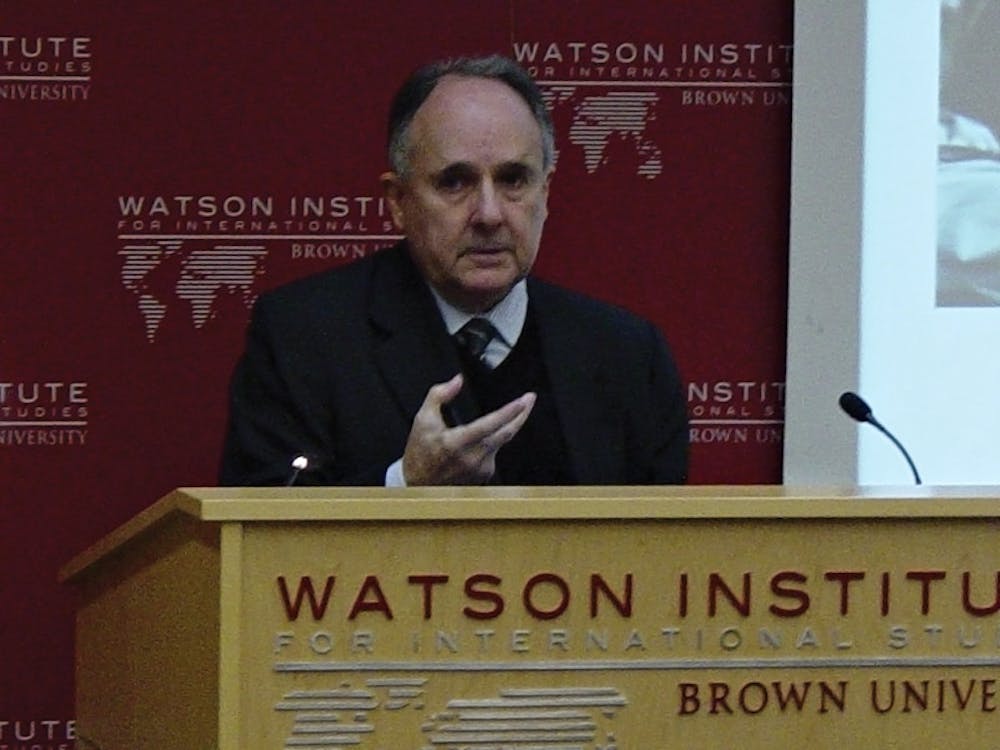Progress as society perceives it may not always be positive, said Cristovam Buarque, a member of the Brazilian Senate, in a lecture Tuesday to a full room at the Joukowsky Forum in the Watson Institute.
“Scientific and technical knowledge is accelerating with a stagnation of ethical development,” Buarque said.
Buarque said labeling scientific innovation as “progress” sometimes comes at the cost of compromising moral standards. He paired his presentation with stark images, including one of a tourist resort in Brazil and neighboring slums.
Progress is not always consistent with rationality, he said, citing the evolution of combat weaponry from bows and arrows to bombing planes as an example of irrational technological progress.
These conflicts between rationality and supposed progress led Buarque to question what progress really is, he said. The meaning of progress has evolved from a purely physical denotation to a word that encompasses all manners of wealth, he said.
Wealth includes factors such as “freedom, culture, peace, comfort, welfare ... democracy, knowledge, technology,” he said, adding that a few centuries ago society puzzled over how to represent all of these qualities in one concept.
“Two hundred years ago we created the term ‘GDP’ in the hopes of quantifying wealth,” he said. “In a real sense, progress should be able to encompass all of these aspects.”
In the 19th and 20th centuries, progress became tied to the economy through the Industrial Revolution and consumer consumption.
The concept of progress has led to vast socioeconomic differences in different countries, he said.
“Until 30 years ago, the world was divided by (an) iron curtain separating socialists and capitalists,” he said. “But the curtain is still there. Now it is a curtain that crosses every country, separating rich people from poor people.”
“We have the walls of shopping malls, of good schools,” he added, gesturing to images of large fences separating areas of extreme poverty and wealth around the world. “Our cultures are separated.”
Buarque noted a distinction between the concepts of inequality and separation. Those with access to better education and resources are separate from those lacking these resources, he said.
To match the “level of consumption” in the United States throughout the world, the globe would need six times its current resources, Buarque said. To match the consumption of the richest decile of Americans “would take the resources from dozens of planets Earth,” he said to a visibly startled audience.
Vivien Caetano ’15 said she attended the lecture both because she is Brazilian and because some of the ideas related to her class POLS 1415: “Classics of Political Economy.” Caetano added she particularly liked Buarque’s concept of walls as both physical and social.
In the 30-minute question and answer session that followed, Buarque fielded questions from audience members.
When asked why politics and a more encompassing idea of progress can clash, Buarque said, “If I start considering certain other factors of progress, I won’t get any votes.” He added, “Some people today think democracy is about doing what’s best for people today — not for the future.”
Buarque will speak at two more events next week as part of a seminar series co-sponsored by the Department of Portuguese and Brazilian Studies and the Graduate Program in Development. Tuesday he will discuss the rise of Brazil, and Wednesday he will describe modern political challenges.

ADVERTISEMENT




